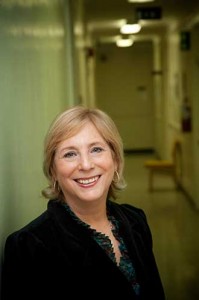
A lifetime of achievements earns Laurie Gottlieb nursing’s highest professional honour
By Pascal Zamprelli
When Laurie Gottlieb was about seven years old, she decided to appoint herself school nurse. She kept it a secret, but would stand guard watching the other children play, and rush to help them if anyone got hurt. “When somebody asks me “tell me about yourself,” my first response is always to tell them that I am a nurse,” she said. “It’s just who I am.”
And so it was that a self-imposed schoolyard duty set in motion an illustrious career for which Gottlieb, who today is the Flora Madeline Shaw Chair in Nursing at McGill, was awarded the prestigious Order of Merit from the Ordre des infirmières et infirmiers du Québec at their recent annual convention. It is the professional order’s highest distinction, given annually in recognition of a nurse’s outstanding contribution to nursing, health care, and the development of the profession. She was also awarded the Prix du Conseil interprofessionnel du Québec.
Gottlieb’s exceptional career includes serving as Director of the School of Nursing and Associate Dean of the Faculty of Medicine from 1995 to 2000, and since 1992 she has been editor-in-chief of the oldest peer-reviewed nursing academic journal in the country, the Canadian Journal of Nursing Research, which she essentially saved from oblivion upon taking over. She played major roles in the establishment of the first nursing program at an Anglophone CEGEP, Canada’s first PhD program in nursing (a joint McGill-Université de Montréal endeavor), and the integrated DEC-BAC program.
But perhaps the accomplishment most central to Gottlieb’s career represents the thread that runs throughout it: helping define, develop, and advance a framework of practice – the McGill Model of Nursing – that has been emulated across Quebec, Canada, and the world.
The McGill School of Nursing’s approach to the profession had always broken with tradition, and developed a unique perspective that would eventually transform the practice. By the mid-seventies, Gottlieb had completed both her Bachelor’s and Master’s in nursing at McGill (She later obtained her PhD in development psychology at McGill). At this time, the community was abuzz because of an exciting new project: Joan Gilchrist, who was then Director of the school, and Dr. Moyra Allen, were about to launch the first research unit in nursing and healthcare in Canada.
The role of nurses was expanding, and Gottlieb was one of the members of the research team tasked with comparing McGill’s novel approach – then generally referred to as “situation-responsive nursing” with its focus on family health and working with strengths – with the more traditional “physician replacement” model.
“Many of the ideas had been values at McGill and had evolved since the School was first founded in 1920,” Gottlieb said. “Dr. Allen had the vision and courage to articulate and label some of these values and added her own. What in effect she did was make the invisible, visible. Nurses then developed these ideas in practice and what we did was to describe, elaborate and evaluate whether this approach in nursing made a difference.”
And, it did. By the 1980s, the new approach was moving from avant-garde to mainstream thinking in the profession. But it was doing so under a variety of labels. So Gottlieb gave it its definitive name.
“I called it the McGill Model of Nursing,” she said, “for very good reason – because I believe that these were the values that had been part of the school, transmitted from class to class to class. I called it that to truly reflect the contributions of this whole community.” After all, she says, it is the community, and no one person, who has ownership of the model.
Gottlieb continued to work with the McGill nursing community to develop and elaborate the core ideas: collaborative partnership, strengths based care, family mindedness and development. She has taken the model in new and exciting directions and has published extensively on it. And as graduates went on to assume leadership roles in the hospitals and communities, they brought these ideas forward in the clinical areas across the province.
So when the 2000 nurses in attendance at the ceremony heard Gottlieb’s name announced (the winner was kept a secret until then), a buzz immediately filled the room. Everyone there knew why she was being recognized, because they had all not only heard of the McGill Model, but have lived it every day of their careers.
“[The award] is not only a testament to me, but to this whole McGill community and to this school in particular,” Gottlieb said with characteristic humility. “It really is seen as a leader in thinking and in nursing. This was recognition of McGill’s contribution.”
It is a contribution that has shaped the nursing profession throughout Canada, and beyond. In the words of the Ordre, “Gottlieb’s unflagging commitment to developing this model has been crucial to making it known and renowned worldwide.” To wit: a woman approached Gottlieb at this meeting to let her know that she was involved in a project that could transform nursing in Africa, using the ideas from the McGill Model of Nursing.
And Gottlieb continues to shape the practice in a way only educators can. One of her own students also approached her at the ceremony, to tell her, “I would like to have a career just like yours.”
Replied Gottlieb, “I just did the things that I loved to do and that I felt passionate about.”
